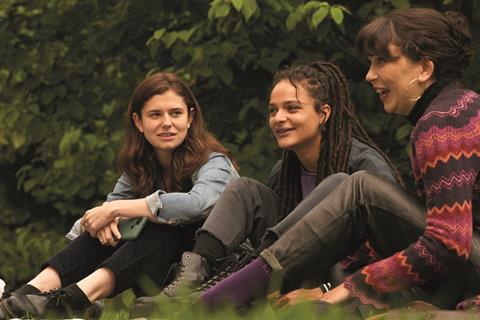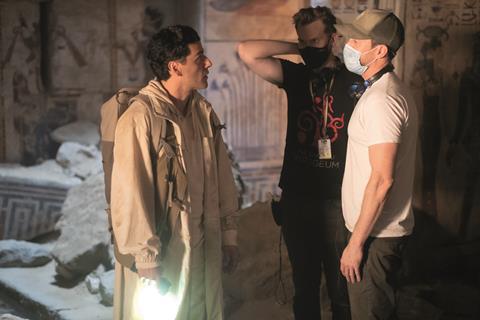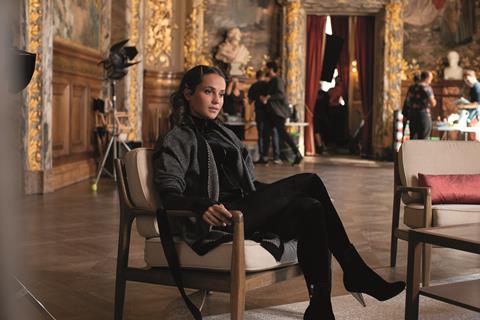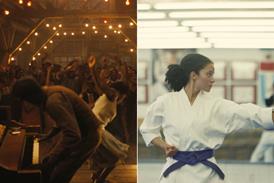Festival-favourite filmmakers including Olivier Assayas and Lenny Abrahamson tell Screen why they are being tempted by episodic TV.

Irma Vep, Olivier Assayas’ new limited series take on his own 1996 feature of the same name, sees an acclaimed but harried director insist the eight-episode series he is shooting is in fact a film — because “I don’t do series”.
It is a disconnect that may be experienced by more and more filmmakers who have been lauded for their features on the festival circuit, as they apply their talents to episodic projects for the content-hungry streaming world.
Arthouse filmmakers have, of course, been making forays into episodic television for at least the last decade. Jane Campion was a pioneer with her two Top Of The Lake series; the late Jean-Marc Vallée brought his visual style to Big Little Lies and Sharp Objects; Park Chan-wook shot all six episodes of the small-screen version of The Little Drummer Girl; and, most recently, Barry Jenkins directed the entire run of The Underground Railroad, while also contributing scripts and acting as showrunner.
But the trend has become especially apparent this year, with festival filmmakers attached to a slew of current Emmy contenders.
UK writer/director Clio Barnard — known for festival prize-winners such as The Selfish Giant — is the sole director on The Essex Serpent from Apple TV+; Mike White, writer of Chuck & Buck, is creator and director of The White Lotus from HBO/HBO Max; Under The Banner Of Heaven (FX on Hulu) comes from creator Dustin Lance Black, writer of Milk; Moon Knight, from Disney+, has fantasy festival regulars Aaron Moorhead and Justin Benson directing two key episodes; Chilean filmmaker Pablo Larrain is director and showrunner on Apple’s Lisey’s Story; and Conversations With Friends, from Hulu and the BBC, has Room Oscar-nominee Lenny Abrahamson as its directing lead.
The popularity of the limited series format, giving filmmakers a chance to alternate between streaming and feature projects, is one factor driving the crossover trend. Another is the range of material the format, and the streaming platforms that increasingly favour it, can accommodate.
“Television used to be the medium where there needed to be more ‘crash bang wallop’,” says Abrahamson, who before Conversations With Friends directed Normal People, another adaptation of a Sally Rooney novel, also produced for the BBC and Hulu by Ireland’s Element Pictures. “The idea of an arthouse approach operating on television was not something anybody really envisaged. But now you can pull an audience in to something quite detailed and low-key on television.”
A contraction in the theatrical market for non-blockbusters may also be pushing the trend — along with a growing appetite from the streamers for book adaptations and the expansion into TV of specialised film companies such as Element and Irma Vep producer A24.
Iain Canning, joint managing director of See-Saw Films, executive producer of Top Of The Lake and The Essex Serpent, states that “when we’ve been faced with a beautiful novel that we want to adapt, it feels very instinctive to us to find a filmmaker who also wants to tell that novelistic story in a number of parts. It feels very much in our DNA as a company.”
Changing tastes

Probably the primary driver of the trend, though, has been the rise of the streamers themselves. While premium cable networks HBO and Showtime (with projects such as David Lynch’s Twin Peaks continuation) have always made occasional use of film talent, streaming platforms such as Hulu and Apple have made limited series with an arthouse feel and festival talent behind the camera a big part of their menus.
Even the more family oriented Disney+ has created opportunities for a few indie filmmakers through the original programming on its branded Marvel hub. “We approach our series like movies,” says Marvel Studios executive and Moon Knight executive producer Grant Curtis, “so we’re looking for the best filmmakers.”
For the platforms, such creatives can produce content efficiently while attracting talent, audiences and awards to the series they deliver.
“Many of the indie filmmakers we work with are used to doing things quickly, exceptionally well and on small — or smaller — budgets,” says Hulu Originals head of drama Sasha Silver. And the filmmakers’ names, she adds, “can be a great calling card for our shows”.
Film creatives can also help streamers reach a certain kind of viewer, suggests Silver. “Audiences are smart and increasingly crave sophisticated stories, plot and characterisation. Bringing indie filmmakers into the fold has allowed us to continue to push those creative boundaries, but still be able to deliver shows to the widest audience possible, which is a hallmark of our overarching strategy.”
For filmmakers, limited series can offer plenty of opportunities as well as the occasional challenge. The culture of television-making, where writer/producers traditionally have more control than directors, can take some getting used to for independent filmmakers. Most, however, say that working on limited series did not mean sacrificing creative freedom to any significant degree.
On Moon Knight, for example, Benson and Moorhead, who collaborated on every aspect of indie features including The Endless and Synchronic, found room to explore within the Marvel brand. “Of course there are boundaries, when you’re not answering to just yourself,” says Benson. “But once you find them, it’s a very large playground. Because the whole reason they brought you on is to make it more interesting, instead of less.”
Abrahamson, meanwhile, found that Conversations With Friends, which had previously been in development as a feature project at Element, gave him the chance to go beyond what he had done with the Normal People limited series. “Part of the reason I wanted to do Conversations was to push the style even further,” Abrahamson says. “Conversations is a more complex story with multiple significant characters. I liked the idea of seeing if we could be even more forensic, quiet and intelligent in the storytelling.”
Moving with the audience

With older and arthouse audiences returning only slowly to cinemas after the pandemic, streaming platforms look set to become an even more important outlet for complex stories and the filmmakers who want to tell them.
Upcoming limited series such as Park Chan-wook’s The Sympathizer (for HBO), Alfonso Cuaron’s Disclaimer (Apple) and Yorgos Lanthimos’s The Man In The Rockefeller Suit (in development with Element and Searchlight Television) certainly sound like adventurous filmmaking ventures, however the finished products are labelled.
Trying to distinguish between series and films is pointless for Assayas, who was first caught in the debate with his 2010 miniseries Carlos, which was also released as a feature in some countries.
Assayas says that in his new Irma Vep — which had a Cannes Film Festival premiere just ahead of its early June debut on HBO and HBO Max — he is “making fun of myself” with the insistent director character, whose series-within-a-series is based on his own feature, which in turn — just like Assayas’ 1996 film — is about an attempted remake of silent‑era movie serial Les Vampires.
For Assayas, “there’s only one way of making movies that I’m familiar with, and I use it whatever the project. I have just shot an eight-hour story and it doesn’t matter very much to me what name you tie on it.”























No comments yet